We’re at another final week of a month which often means meetings that are somewhat out of the ordinary. That’s one theme this week.
- The Albemarle Board of Supervisors will hold a public hearing Wednesday evening on the proposed $629M budget for fiscal year 2025.
- The Charlottesville City Council will hold a work session Tuesday on future fuels for city-owned public transportation.
- The Nelson County Planning Commission will deliberate Wednesday on their recommendations for the 2042 Comprehensive Plan.
- The University of Virginia’s Board of Visitors will meet this week, though the materials for their discussion aren’t posted at publication time.
There are also some regularly scheduled meetings:
- The Greene County Board of Supervisors on Tuesday will review suggested priorities to implement the Comprehensive Plan, providing a look into whether three new members support continued work to create a new reservoir at White Run.
- The Albemarle Planning Commission will hold another work session on that county’s Comprehensive Plan update, this time focusing on Rural Land Use and Transportation on Tuesday.
- The Charlottesville-Albemarle Metropolitan Planning Organization meets on Wednesday for the latest in regional transportation discussions
- The Charlottesville Redevelopment and Housing Authority’s Board of Commissioners meet on Monday evening.
There are no meetings in Louisa County this week.
Thanks to the Piedmont Environmental Council for their sponsorship of this weekly newsletter into what’s happening at these meetings.

Monday, February 26, 2024
CRHA Board of Commissioners to meet
The Board of Commissioners for the Charlottesville Redevelopment and Housing Authority will meet virtually at 6 p.m. There are no land acquisitions or purchases for the Commissioners to approve at this meeting. (Zoom link) (agenda)
After the opening of the meeting and announcements, there will be a public comment period in addition to comments from the Public Housing Association of Residents.
The first item is a discussion of planning for the upcoming Board retreat. There will also be a finance update, a housing department update, an update on the Housing Choice Voucher program, and then more public comments.
From the public housing program report, we learn that 60 of the units at Crescent Halls are now occupied and another three will move in before the end of the month.
“Our relocation team has expressed an issue with some applicants having trouble getting their deposit money, in which we are assisting them with finding resources, as well as some moves being rescheduled due to bed bug issues,” reads the report.
Bed bugs can be present in multifamily units and there’s even a section of the University of Virginia Housing and Student Life devoted to the issue. The CRHA has hired staff members to work on pest control.
“To date, all CRHA units have been treated at least once by in house pest control as long as we were able to gain entry,” the report continues.
The housing report lists the delinquent balances as of February 22, 2024 and for the first time includes this amount for the units purchased by CRHA last year from Woodard Properties with $5 million in assistance from City Council. Residents of those properties owe $60,829 in unpaid rent.
From the Deputy Director’s report we learn there are 219 people enrolled in the CRHA’s Section 3 program. That’s a federally-mandated job training program, according to the U.S. Department of Housing and Urban Affairs’ website. One individual was served, another is currently receiving support for employment, and there is one person employed through the Section 3 program. That’s the exact same copy I used in the Week Ahead for January 29, 2024 because it’s the exact same information.
From the same report, we learn that there is work going on through Resident Services to get people trained through Piedmont Virginia Community College on maintenance programs.
“We currently have some positions available at CRHA and would like to fill them as soon as possible,” reads the end of page 5 of the report.
In other meetings:
- The meetings of both the Albemarle Historic Preservation Committee and the Pantops Community Advisory Committee have been canceled.
Get more from Sean Tubbs in the Substack app
Available for iOS and Android
Tuesday, February 27, 2024
Greene Supervisors to review Comprehensive Plan priority recommendations from PC
The Greene County Board of Supervisors will meet at 5:30 p.m. in the Administration Building in Stanardsville. (agenda)
There will be a public hearing for a special use permit for a home business at 912 Amicus Road in the county’s rural area. The request is to use the property for an auto repair and towing business, according to the application. The Planning Commission recommended denial at their public hearing on January 17, 2024, according to the staff report.
The applicants say being able to do the work at their house will keep their costs low.
“We want to be able to provide our customers with prices they can afford and in order to do that we are trying to get our business license at home,” writes Christina Sims in a letter to the county.
Public comments about the project are also available for review. An adjacent landowner writes that their driveway would be required to access the lot and that it’s not safe for public use.
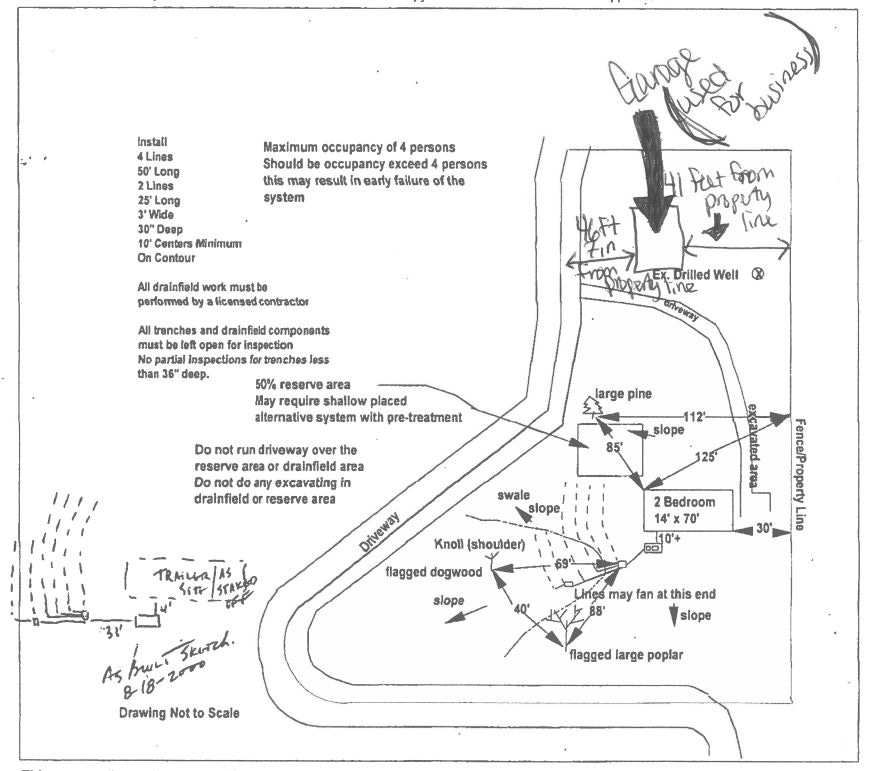
Three new Supervisors were elected to the Board in November, and many want more oversight of county government through the creation of many new committees. There’s a memo in the packet from Assistant County Attorney Kelley Kemp about how any groups created by the board are subject to Virginia’s open meeting requirements.
“Under the Virginia Freedom of Information Act (FOIA), any committee that the Board creates is an extension of the Board,” reads the memo. “It does not matter if all the members of the committee are Board members or not.”
The memo goes on to say that the County Administrator can appoint committees that would not be subject to FOIA such as a temporary committee to assist with construction projects. However, Kemp advises against creating such a committee with a Supervisor as a member because it may be perceived as “subterfuge.”
According to the draft minutes of the February 13, 2024 meeting, Supervisor Francis McGuigan sought to create a Rural Advisory Committee and a Budget Citizen Advisory Committee that he requested not be subject to FOIA.
At this meeting, there will also be updates from the Public Safety Foundation and on two acronyms. CERT and ARES. Any ideas on what those mean? There’s no staff report.
There are also a few action items. One is on implementation priorities the Planning Commission recommended in September 2023. At that time, it was clear there would be three new Supervisors so the presentation of these recommendations was deferred until now. There are 12 recommendations in all, quoted below:
- Greene County will proceed with constructing the White Run pumped storage reservoir project.
- Greene County will encourage commercial and residential development and provide adequate water pressure and supply for Stanardsville.
- Implement the completed engineering design for a new Stanardsville area water and sewer network
- Greene County will ensure the integrity of wastewater treatment facilities through comprehensive system upgrades, including for the Town of Stanardsville.
- The Construction of a new elementary school to support projected increases in enrollment and economic growth in Greene County. This is not only to support the forecasted enrollment increases but also as part of the comprehensive facility study completed in 2016 that led to the Stanardsville campus, WMMS, WMHS, and RES campus improvements.
- The ongoing expansion of our Career and Technical Education facilities and programming to meet the needs of our students and adequately respond to the dynamic changes in postsecondary workforce needs
- Greene County will investigate measures to encourage and retain farming and land use operations by the following actions:
- a. Establish a stakeholder group to develop recommendations for land use tools that will promote and support rural opportunities.
- Update County Zoning and Subdivision Ordinances to reflect the recommendations included in this chapter.
- a. The Planning Commission recommends a zoning revision to include a new Technology and Flex Research and Development District.
- Greene County will promote safe travel for pedestrians, bicyclists, and motorists
- Apply calming traffic techniques in current developments and new developments as appropriate.
- Encourage sidewalks and planting strips, medians, bicycle lanes, and narrow streets.
- Greene County will support the completion of phases one and two of the master plan for Greene County Community Park through:
- Development of a recreation community center, athletic fields, and additional passive recreation improvements (trails, outdoor recreation, etc.) to meet the needs of the growing/changing community’s desires.
- Greene County will support the development of a public swimming area.
- Encourage residential development of affordable housing in or near Stanardsville.
- Encourage the development of missing middle mixed-income housing, particularly in the Ruckersville and Stanardsville areas. This could take the form of a Low-Income Housing Tax Credit (LIHTC) project.
- Create an Accessory Dwelling Unit implementation guide/toolkit to promote the mutual affordability benefits of ADUs to homeowners and renters & promote grant programs targeted to ADU creation.
- Greene County will create a county park in Ruckersville.
Get more from Sean Tubbs in the Substack app
Available for iOS and Android
Charlottesville City Council to discuss future fuel recommendations at work session
In a community where developers have responded to calls for urban density along transit corridors by building units and planning to build more, a more efficient public transportation system is often cited as a primary way to mitigate road congestion by providing a reliable alternative to driving.
How will public transportation be governed in the future in this community? There’s both a Regional Transit Vision Plan and a Regional Transit Governance Study to inform some of that discussion.
But judging by activity levels at public comment periods and letters to newspapers, the largest transit issue in this community appears to be the future fuel sources for vehicles with a large push from several advocacy groups who insist the City of Charlottesville invest in converting the fleet to non-diesel vehicles as soon as possible, or at least to make a commitment to no longer purchase any vehicles that run on fossil fuels.
For a full recap, here are several stories:
- City Council gets update on study on future fuels for CAT, August 2, 2023
- Sanders addresses community feedback on fuel for public transportation, September 11, 2023
- Charlottesville Area Transit fuel study recommendations delayed until January, November 10, 2023
- CAT fuel study recommends purchase of two battery-electric vehicles in 2024 for pilot , January 16, 2024
- Council briefed on request to pilot two alternative fuel sources for CAT, January 27, 2024
Now, a quicker recap. A study conducted by the firm Kimley Horn has recommended purchasing two battery-electric vehicles in the near future and pursuing the purchase of a hydrogen vehicle in 2027. That would provide additional time to evaluate emerging technologies while also replacing some vehicles with diesel buses as needed.
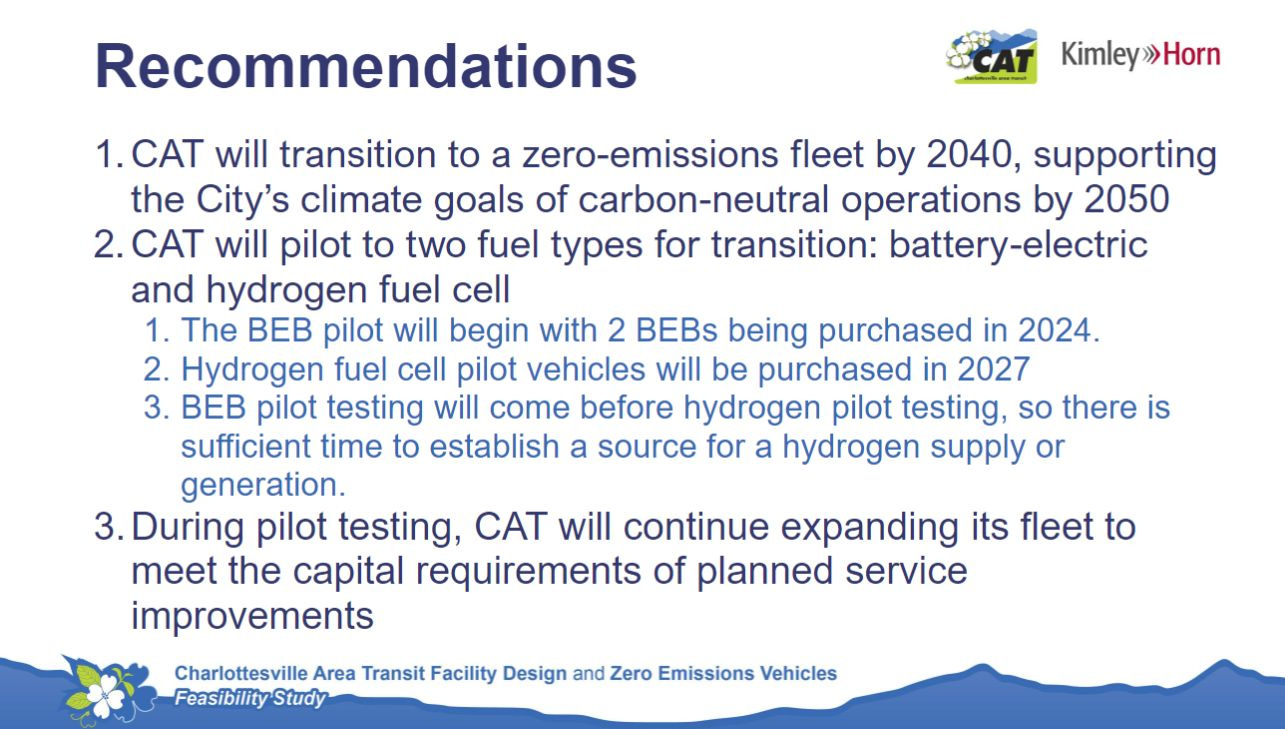
At this meeting, Council will also hear from the Office of Sustainability and the Department of Neighborhood Development Services. The report from the latter will address the campaigns led by the Community Climate Collaborative and Cville 100.
No one appears to have advocated for Charlottesville Area Transit to implement a System Optimization Plan preliminary endorsed by City Council in 2021 two and a half years ago. Here’s a story I wrote a year later in June 2022 when the Regional Transit Partnership got an update.
Every time I ask why these route changes and service expansions have not been made, I get a variation of what is stated in this presentation.
“The [System Optimization Plan] has not been implemented, due to driver, vehicle, and parts shortages,” reads page 21 of the presentation.
An update on the system optimization plan begins on page 24 in the form an update on the Transit Strategic Plan which the slide states will lay “a path away from existing Extended Lifeline service and toward the expanded services in the regional vision.”
Council will get an update on that plan at a work session on April 16.
CAT Director Garland Williams has consistently explained that he does not feel existing battery-electric vehicles are up to the task of delivering service reliably.
It is perhaps worth mentioning here that there used to be an advisory board for Charlottesville Area Transit, but it was dissolved sometime during the pandemic.
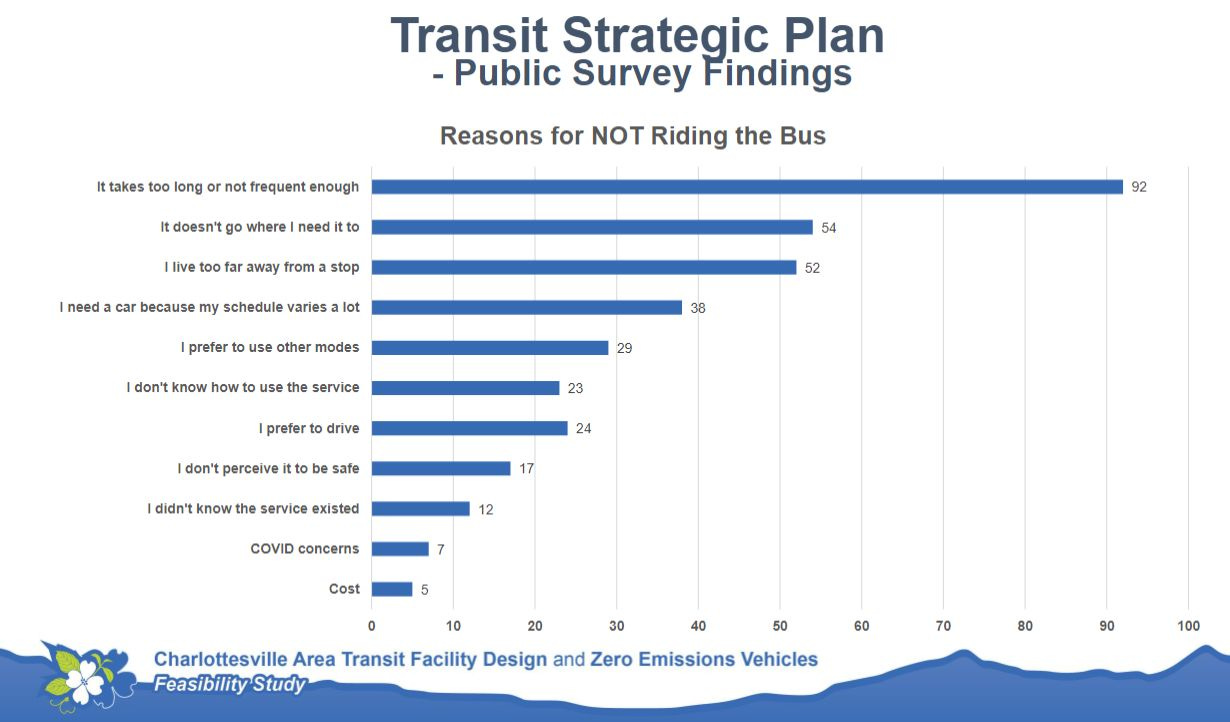
In other meetings:
- The Rivanna Water and Sewer Authority’s Board of Commissioners will have their regular monthly meeting at 2:15 p.m. There will be an update on the Rivanna Pump Station and efforts to pinpoint what went wrong in January as well as an introduction of the RWSA’s capital budget for the next five years. (agenda)
- Savion, the developers of a 90 megawatt photovoltaic project called Wild Rose Solar, will hold a community meeting in Gladstone at the Gladstone Fire and Rescue Squad at 5 p.m. The address is 8786 Richmond Hwy, Gladstone, VA 24553. I was able to find materials in the form of a November 2023 presentation for the project that will be located off of Route 60 between Amherst County and Buckingham County. The project needs a special use permit. (view the November 2023 presentation)

Planning Commission to hold public hearing on changes to Albemarle’s cell tower policies
One of my biggest laments at the moment is an inability to write as much as I would like about the ongoing update of Albemarle County’s Comprehensive Plan. The AC44 process is at the tail end of Phase 2 and the Planning Commission last had a work session on February 13, 2024. I recorded the meeting but have been unable to review it yet or write it up the discussion on Development Areas Land Use and Transportation and Community Facilities.
Thankfully there are 47 pages of draft minutes from that meeting to review what was said.
On Tuesday, planning commissioners will resume their discussion of goals and objectives by discussing the drafts in the Rural Area Land Use and Transportation chapter. They meet at 4 p.m. for a work session. (meeting agenda)
For decades, Albemarle has had a strict interpretation that non-agricultural businesses are discouraged or prohibited in the rural area. A theme in the AC44 process is to reevaluate some of that interpretation while retaining the same basic principle that has been in place.
“While the provision of public services and infrastructure will continue to vary between the Rural Area and the Development Areas, the Comprehensive Plan update is an opportunity to find ways to provide, support, and distribute some public services in the Rural Area in a more equitable manner,” reads the staff report for the work session.
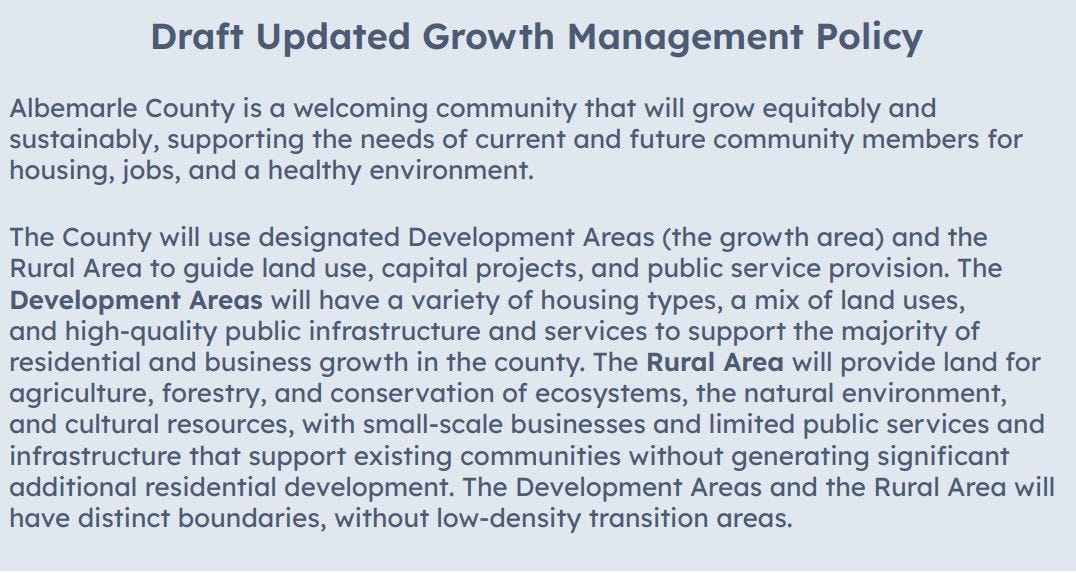
There are two public hearings at the 6 p.m. regular session. The first is for a rezoning of 7.2 acres from R-6 to Planned Residential Development for a 244-unit apartment complex on Woodburn Road. In all there would be five buildings and the apartment would connect to a Woodbrook Drive. (staff report)
“The proposed community would offer needed housing options for County residents and would contribute to the urban redevelopment of the surrounding area envisioned by the Rio29 Small Area Plan, including by adding more residents who will support the implementation of the Rio29 Small Area Plan,” reads the applicant’s narrative.
The second public hearing is on potential changes to Albemarle’s policies on the siting of cell towers for personal wireless communications. For many years, the county has put a premium on aesthetics with a goal of restricting visibility. A review has been underway for some time, and the Planning Commission last discussed this matter last June as I wrote about at the time.
The Planning Commission will hold a public hearing on recommended changes including allowing more treetop towers in areas currently listed as avoidance areas, removing limits on the number of arrays allowed on a tower, and limits on the size of antennas.
An online survey seeking input resulted in over 700 responses. All of that can be seen from the staff report.
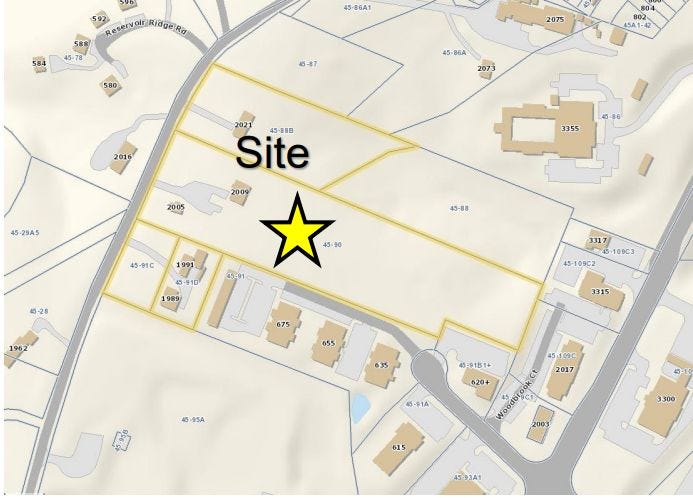
Wednesday, February 28, 2024
Public hearing for County Executive Richardson’s $629M budget for FY25
There is a lot of talk about “news deserts” as defined by places where it is very difficult to find third-party reports about a local community. Is Albemarle County one of these?
The Board of Supervisors will have a public hearing on County Executive Jeffrey Richardson’s recommended $629 million for FY25 at 6 p.m, in Lane Auditorium in the county’s office building at 401 McIntire Road. (agenda)
As I begin writing out this segment, only relevant story comes up in a news.google.com search on “Albemarle County FY25 budget” and that’s a February 22, 2024 story by Amaya Mitchell on NBC29 that previewed School Superintendent Matthew Haas’ budget proposal.
To diversify my search, I went to a similar search on Bing and that revealed a five paragraph story from WINA.
I’ve written two stories on the reveal of the budget across two newsletters and consolidated them into one story posted today to Information Charlottesville. Take a look at those, and if I’ve missed any other coverage, please let me know. My resources are limited, but writing about budgets seems to be one of the most crucial components of municipal budgeting. Thanks to paid subscribers and sponsors, I’m able to get these basic articles out. The community deserves information. I’ve made it my business to provide it.
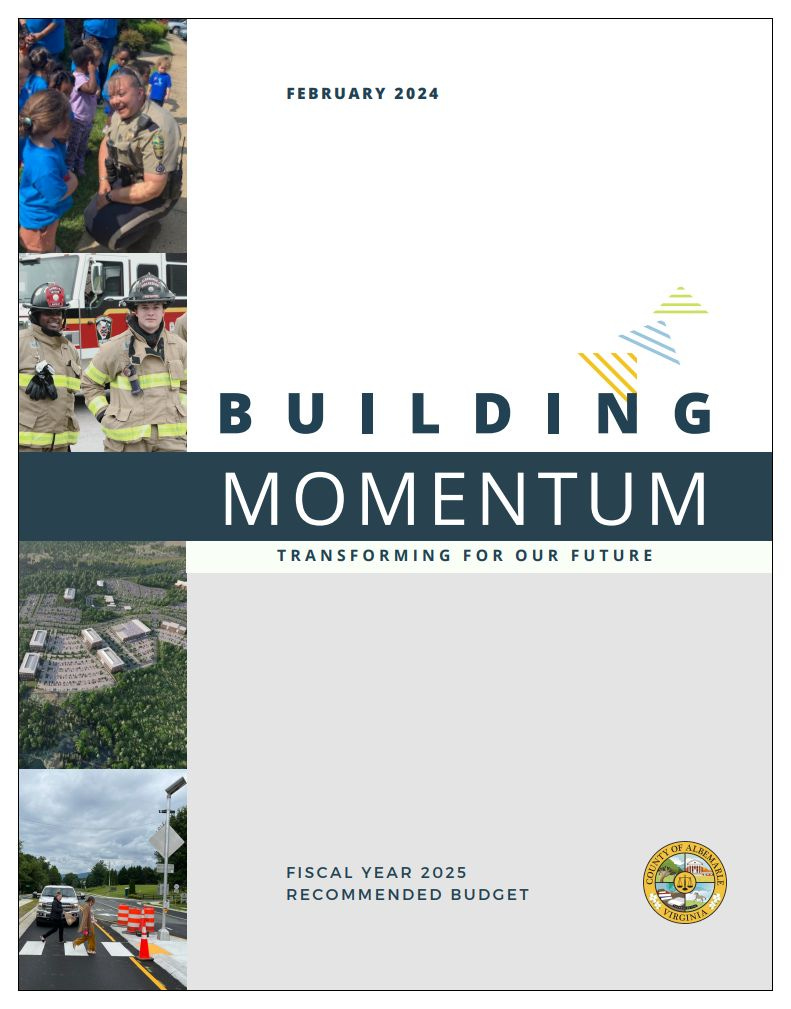
Nelson County’s updated Comprehensive Plan to go before Planning Commission
On January 31, the Nelson County Planning Commission held a public hearing on the draft update of the Comprehensive Plan. They’ll make their recommendations at this special meeting that begins at 7 p.m. in the General District Courtroom in the Nelson County Courthouse in Lovingston. (meeting packet)
From the minutes of that meeting, we learn that the Berkley Group has been working on the update for two years. Comprehensive Plans are frameworks and not regulatory themselves but provide guidance on the direction a community should take. Here are eight key take-aways listed in a presentation.
- Rural character and environment considered most valued asset
- Nelson has a strong sense of community and identity
- Improving housing choice and quality is a priority focus
- Target commercial and economic growth on the 29 corridor
- Any new development should be strategic and not impact rural development
- Transportation safety improvements are a top priority
- Schools and educational opportunities are top priorities for the future
- Improve recreation and alternative transportation
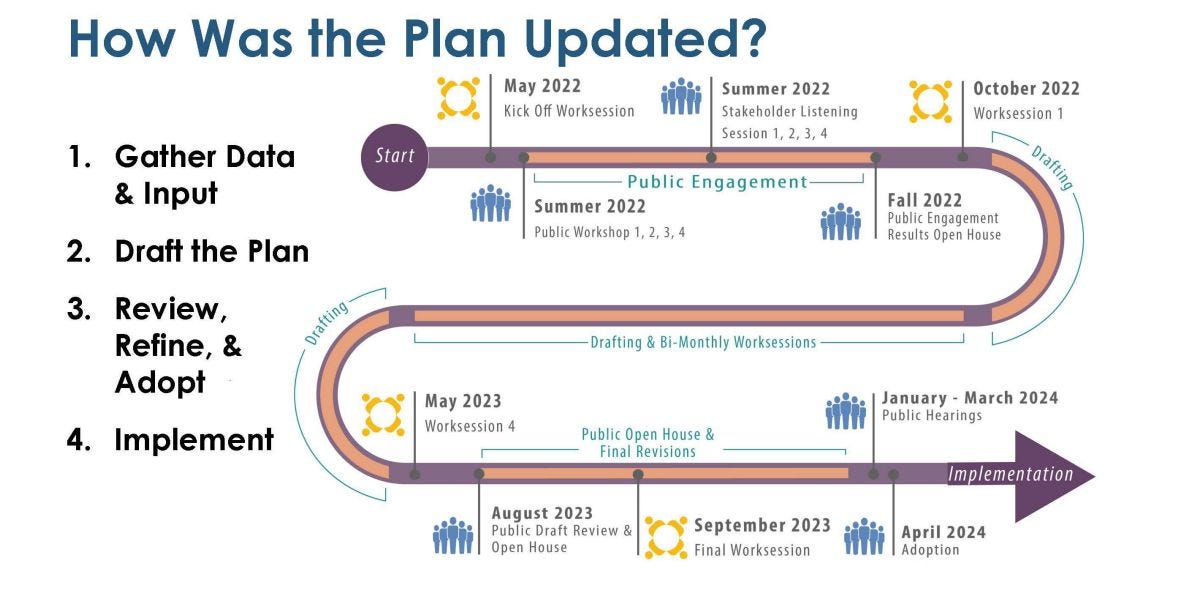
The first public speaker at the public hearing was Jayne Hoffman representing a new group called the Keep Montebello Rural Coalition that is building off another group called the Montebello Clean Mountain Coalition. The group formed after learning of several rural tourism projects in the area.
“The threat of commercial development within the Montebello Region sparked our community to unite as the KMRC and we have made it part of our mission not to be caught unaware in the future,” reads a hand-out they submitted as part of their public comment. They support language in the Comprehensive Plan that supports their rural preservation efforts, but want the term “by-right” to be redefined.
Among other things, the second public speaker sought creation of a maintenance code to require property owners to keep their structures in compliance. A third public speaker wanted tougher language against utility-scale solar installations. A fourth public speaker said it was too late to save rural Nelson because it’s already been destroyed. A fifth public speaker sought protection against dense development and cited Charlottesville’s new development code as something not to emulate.
And so on for another several speakers. I wish I had the resources to do more because as Albemarle and Charlottesville continue to grow, there will be more pressure on all of the outlying communities. A key item to note is that the Weldon Cooper Center for Public Service at the University of Virginia still projects Nelson County remaining flat through 2050.

In other meetings:
- The Charlottesville Retirement Commission will meet at 8:30 a.m. in the CitySpace Large Conference Room (meeting packet)
- The Charlottesville Sister Cities Commission’s Besançon Committee will meet at 4 p.m in the City Space Small Conference Room (agenda)
- The Albemarle Broadband Authority will meet at 5 p.m. in Room 241 of Albemarle County’s Office Building at 401 McIntire Road. (agenda)
- The Albemarle Fire / EMS Board will meet in the Room 235 of the County’s Office Building at 401 McIntire Road. On the agenda is a discussion of department review of land use plans. (agenda)
- Members of the University of Virginia Board of Visitors will begin their February meeting but there are no public events. Those will begin on Thursday but the materials are not available at publication time. (meeting info)
Thursday, February 29, 2024
The University of Virginia Board of Visitors will meet all day with the Health System meetings in the morning at the Boar’s Head and other meetings in the Rotunda in the afternoon. The meetings are live-streamed on YouTube but you have to watch in real-time or you will miss it. The Board of Visitors is subject to Virginia’s open meeting rules. (meeting info)
In another Leap Day meeting:
- The Fluvanna County Board of Supervisors will have a budget work session at 5:30 p.m. in the County Administration Building at 132 Main Street in Palmyra. Last week, County Administrator Eric Dahl presented a $107,555,422 budget for FY25. (budget page)
Friday, March 1, 2024
The UVa Board of Visitors continues their spring semester meeting all day. (meeting info)
This post was contributed by Sean Tubbs. Sean is a journalist working to build a new information and news outlet centered around Charlottesville and Virginia. In 2020, he launched a daily newscast and newsletter and also created a semi-regular podcast on the pandemic.
Support for Sean’s “Week Ahead” update comes from The Piedmont Environmental Council.
